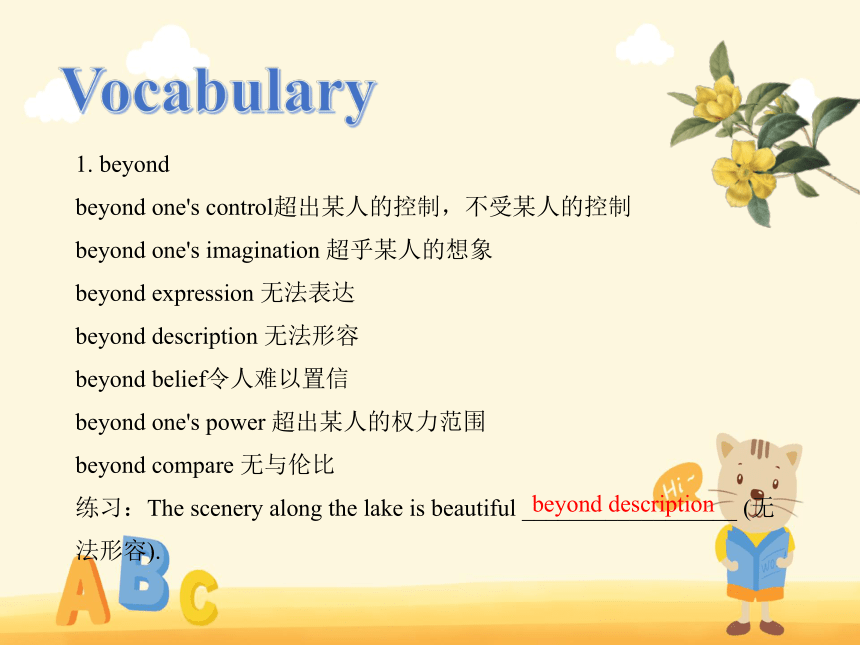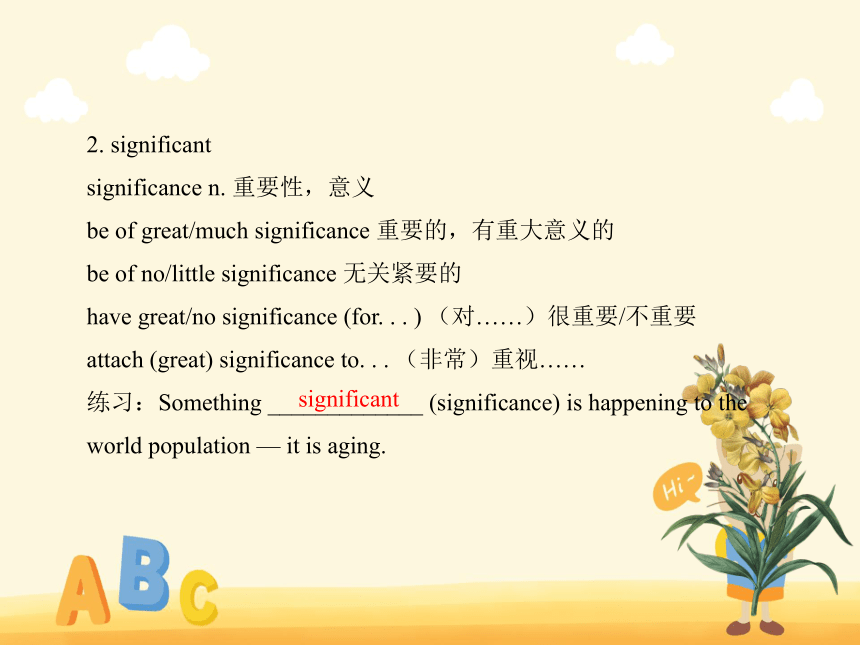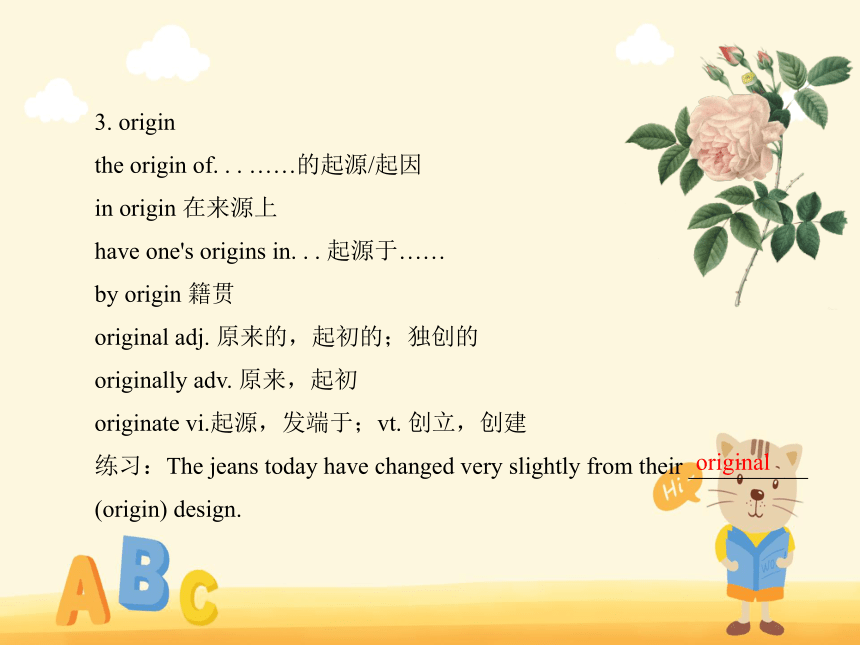外研版(2019)必修第三册Unit 3 The world of science Section B Using Language 课件(13张ppt)
文档属性
| 名称 | 外研版(2019)必修第三册Unit 3 The world of science Section B Using Language 课件(13张ppt) |  | |
| 格式 | ppt | ||
| 文件大小 | 7.6MB | ||
| 资源类型 | 教案 | ||
| 版本资源 | 外研版(2019) | ||
| 科目 | 英语 | ||
| 更新时间 | 2022-09-15 23:37:21 | ||
图片预览






文档简介
(共13张PPT)
Section B
Using Language
1. beyond
beyond one's control超出某人的控制,不受某人的控制
beyond one's imagination 超乎某人的想象
beyond expression 无法表达
beyond description 无法形容
beyond belief令人难以置信
beyond one's power 超出某人的权力范围
beyond compare 无与伦比
练习:The scenery along the lake is beautiful __________________ (无法形容).
beyond description
2. significant
significance n. 重要性,意义
be of great/much significance 重要的,有重大意义的
be of no/little significance 无关紧要的
have great/no significance (for. . . ) (对……)很重要/不重要
attach (great) significance to. . . (非常)重视……
练习:Something _____________ (significance) is happening to the world population — it is aging.
significant
3. origin
the origin of. . . ……的起源/起因
in origin 在来源上
have one's origins in. . . 起源于……
by origin 籍贯
original adj. 原来的,起初的;独创的
originally adv. 原来,起初
originate vi.起源,发端于;vt. 创立,创建
练习:The jeans today have changed very slightly from their __________ (origin) design.
original
4. cure
a cure for. . . ……的疗法/措施
cure sth. 治好……疾病
cure sb. 治好某人
cure sb. of sth. 使某人从某种疾病中痊愈
练习:Medical research often makes use ________ the forests' plant and animal life, and the destruction of such species could prevent researchers from finding cures _______ certain diseases.
of
for
动词的语态表示主语与谓语之间的关系。英语有两种语态:主动语态和被动语态。下面几种情况一般用被动语态:
1.不知道或没有必要说明动作的执行者是谁。
Such books have been written for children.
已经为儿童编写这类书籍了。
2.强调动作的承受者,而不强调动作的执行者。
All these products have been tested. 这些产品都经过测试了。
3.动作的执行者很模糊。
The letter has been opened. 这封信被人拆开了。
4.有时为了礼貌的需要,避免说出动作的执行者。
They have been told many times not to make noises.
已经有人多次跟他们说别那么大声了。
选用被动语态的情况
现在完成时的被动语态的基本构成是:have/has been done。但在不同的句式中,其具体形式也有所不同。
1.肯定句形式:主语+have/has been done (+其他).
The bridge over the Yellow River has just been completed.
黄河上的这座桥刚刚建成。
The plan has been studied by the experts last month.
这个计划在上个月已经由专家研究过了。
2.否定句形式:主语+have/has not been done (+其他).
They haven't been told the exciting news yet, have they
还没有人告诉他们这个令人激动的消息,是吗?
The second-hand car has not been sold. 这辆二手汽车还没有被卖出去。
现在完成时的被动语态的构成
3.一般疑问句形式
Have/Has+主语+ been done (+其他)
-Has her work been finished 她的工作完成了吗?
-Yes, it has. 是的,完成了。
4.特殊疑问句形式
特殊疑问词+have/has+主语+been done (+其他)
How long has the machine been used 这台机器使用多久了?
1.表示被动的动作在说话前已经完成,强调过去的动作对现在造成的影响或产生的结果,通常与 already, yet, never, recently等副词及时间状语 so far, by now, up till now等连用。
The room has already been cleaned.
这个房间已经被打扫干净了。(现在已经不用打扫房间了)
The doctor hasn't been sent for yet.
还没有派人去请医生。(现在应派人去请医生)
现在完成时的被动语态的用法
2.表示被动的动作或状态从过去开始一直持续到现在,并可能继续持续下去,常与for或since等引出的时间状语(从句)连用,或用于how long引出的句子中。
The bridge has been built for two years. 这座桥已经建了两年了。(可能还会继续建造)
How long has the project been carried out
这项工程已经实施多长时间了?(可能还会继续实施)
3. 用在时间状语从句中,表示将来某时已经完成的动作。
We'll start as soon as the work has been finished.
这份工作一完成我们就立即动身。
1. Shakespeare's play Hamlet ___________ (make) into at least ten different films over the past years.
2. - Would you like to go to the cinema with me tomorrow afternoon
-I'd like to, Mum, but I _______________ (invite) to a party by Jane. It is her birthday.
3. Till now, three films _______________ (show) in that small village this month.
4. I want to buy that kind of cloth because I ___________ (tell) the cloth washes well.
5. In the last few years thousands of films ________________ (produce) all over the world.
has been made
have been invited
have been shown
have been told
have been produced
Section B
Using Language
1. beyond
beyond one's control超出某人的控制,不受某人的控制
beyond one's imagination 超乎某人的想象
beyond expression 无法表达
beyond description 无法形容
beyond belief令人难以置信
beyond one's power 超出某人的权力范围
beyond compare 无与伦比
练习:The scenery along the lake is beautiful __________________ (无法形容).
beyond description
2. significant
significance n. 重要性,意义
be of great/much significance 重要的,有重大意义的
be of no/little significance 无关紧要的
have great/no significance (for. . . ) (对……)很重要/不重要
attach (great) significance to. . . (非常)重视……
练习:Something _____________ (significance) is happening to the world population — it is aging.
significant
3. origin
the origin of. . . ……的起源/起因
in origin 在来源上
have one's origins in. . . 起源于……
by origin 籍贯
original adj. 原来的,起初的;独创的
originally adv. 原来,起初
originate vi.起源,发端于;vt. 创立,创建
练习:The jeans today have changed very slightly from their __________ (origin) design.
original
4. cure
a cure for. . . ……的疗法/措施
cure sth. 治好……疾病
cure sb. 治好某人
cure sb. of sth. 使某人从某种疾病中痊愈
练习:Medical research often makes use ________ the forests' plant and animal life, and the destruction of such species could prevent researchers from finding cures _______ certain diseases.
of
for
动词的语态表示主语与谓语之间的关系。英语有两种语态:主动语态和被动语态。下面几种情况一般用被动语态:
1.不知道或没有必要说明动作的执行者是谁。
Such books have been written for children.
已经为儿童编写这类书籍了。
2.强调动作的承受者,而不强调动作的执行者。
All these products have been tested. 这些产品都经过测试了。
3.动作的执行者很模糊。
The letter has been opened. 这封信被人拆开了。
4.有时为了礼貌的需要,避免说出动作的执行者。
They have been told many times not to make noises.
已经有人多次跟他们说别那么大声了。
选用被动语态的情况
现在完成时的被动语态的基本构成是:have/has been done。但在不同的句式中,其具体形式也有所不同。
1.肯定句形式:主语+have/has been done (+其他).
The bridge over the Yellow River has just been completed.
黄河上的这座桥刚刚建成。
The plan has been studied by the experts last month.
这个计划在上个月已经由专家研究过了。
2.否定句形式:主语+have/has not been done (+其他).
They haven't been told the exciting news yet, have they
还没有人告诉他们这个令人激动的消息,是吗?
The second-hand car has not been sold. 这辆二手汽车还没有被卖出去。
现在完成时的被动语态的构成
3.一般疑问句形式
Have/Has+主语+ been done (+其他)
-Has her work been finished 她的工作完成了吗?
-Yes, it has. 是的,完成了。
4.特殊疑问句形式
特殊疑问词+have/has+主语+been done (+其他)
How long has the machine been used 这台机器使用多久了?
1.表示被动的动作在说话前已经完成,强调过去的动作对现在造成的影响或产生的结果,通常与 already, yet, never, recently等副词及时间状语 so far, by now, up till now等连用。
The room has already been cleaned.
这个房间已经被打扫干净了。(现在已经不用打扫房间了)
The doctor hasn't been sent for yet.
还没有派人去请医生。(现在应派人去请医生)
现在完成时的被动语态的用法
2.表示被动的动作或状态从过去开始一直持续到现在,并可能继续持续下去,常与for或since等引出的时间状语(从句)连用,或用于how long引出的句子中。
The bridge has been built for two years. 这座桥已经建了两年了。(可能还会继续建造)
How long has the project been carried out
这项工程已经实施多长时间了?(可能还会继续实施)
3. 用在时间状语从句中,表示将来某时已经完成的动作。
We'll start as soon as the work has been finished.
这份工作一完成我们就立即动身。
1. Shakespeare's play Hamlet ___________ (make) into at least ten different films over the past years.
2. - Would you like to go to the cinema with me tomorrow afternoon
-I'd like to, Mum, but I _______________ (invite) to a party by Jane. It is her birthday.
3. Till now, three films _______________ (show) in that small village this month.
4. I want to buy that kind of cloth because I ___________ (tell) the cloth washes well.
5. In the last few years thousands of films ________________ (produce) all over the world.
has been made
have been invited
have been shown
have been told
have been produced
